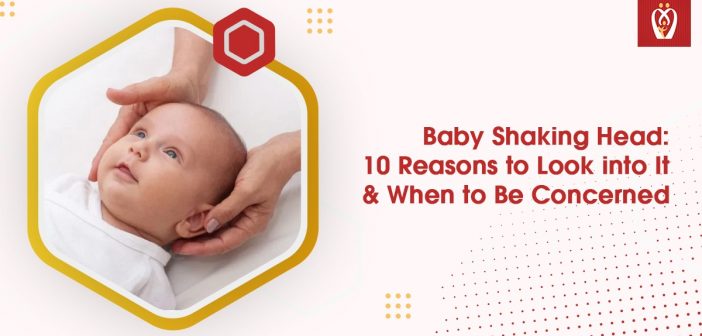Is your baby shaking head side to side? Are you concerned that it could be a symptom of a problem?
What you don’t expect is for your child to shake their head
Understanding your baby’s head movements and why they occur will assist you in identifying developmental milestones as your child grows and develops.
We know your most important concern: should I be concerned if my infant shakes his head from side to side?
The answer is most likely no! During their first year, babies grow quickly. Therefore, the development of gross motor skills is a crucial part. Gross motor skills refer to how your kid functions and interacts with the world around them using their body’s major muscles and appendages.
By the time they are seven months old, most new-borns can sit up, roll over, reach for objects, and explore things with their hands and mouths. Although it can be alarming to observe your infant begin to shake his head, most of the time, they are doing it for one of the reasons listed below
Exploring
Your infant could be experimenting with how their body moves and functions. For example, have you ever taken a moment to notice how your head feels when you shake it? All of these things cause babies to react and explore their increasing range of motion.
Is your kid getting a positive response from others when they shake their heads? They may be doing it to catch your attention.
When they become drowsy, some new-borns move their heads to self-soothe.
Imitating
You may not realise it, but you’ve probably shaken your head at your child. Of course, they may be merely copying what you’re doing. As babies get older, they’ll learn to shake their heads to express “no” in the same way that adults do.
Fatigue
Tired babies may shake their heads, causing dizziness and making it easier to fall asleep.
Ear Infection
Ear infections are most common in children under the age of three, and your baby may be attempting to communicate the problem to you.
Breastfeed
Your baby’s attempt to be breastfed may have caused you to shake your head. Your baby’s head will frequently shift back and forth as they try to latch. As a nurse, they may become enthused. To indicate that they have had enough feeding, the baby may shake their head at the end of the breastfeeding session.
Autism
A baby with simply the symptom of head shaking is unlikely to have autism. Autism-affected babies exhibit different characteristics such as difficulty making eye contact with caretakers or being unresponsive to their names when called.
When Does Baby Shaking Head Indicates That Something Isn’t Right?
It’s natural for a mother to be concerned about her child’s development and some new things they do as they become older. For example, there are a few times when your infant shakes their head to convey discomfort or pain.
It’s time to see your paediatrician if you detect any of the following in connection with your baby’s strange movements.
- Fever, visible scrapes and bruises, or a rash are all symptoms of an infection or injury.
- Evidence of a fall may have resulted in your baby’s head is injured.
- Baby shaking head gets worse when they are stressed or agitated.
- Your child hits their head on the crib or a wall.
- Adults are having difficulty making eye contact with the baby.
- Other delays in development.
- Is exhibiting sluggish behaviour or is having difficulty waking up.
- Legs and muscles are stiffening, uncontrollable shaking or jittering motions, or breathing difficulties.
These are the signs and symptoms of a myoclonic seizure. It’s incredibly uncommon, but it can be catastrophic or even fatal when it does happen. Therefore, parents must be aware of these characteristics and contact their doctor as soon as possible.
An ear infection is the most prevalent reason new-borns shake their heads. A temperature of 102 degrees Fahrenheit or higher is one of the hallmarks of an ear infection in infants who cannot convey their suffering verbally.
Your infant may also grow agitated when placed on their backs, have problems responding to sounds, or have fluid flowing from their ears. Another sign that your kid has an ear infection is if you notice them tugging on their ears.
Trust your mother’s intuition in any situation. After watching the situation, if baby shaking head is happening in a way that it concerns you, seek advice from your paediatrician. They will be able to provide you with additional assistance.
Habitual behaviours
Unusual repetitive activities include slamming one’s head against objects or other self-harming manoeuvres.
Lack of interest
Even at a young age, babies can interest in what is going on around them. Bring it up with your child’s doctor if your infant appears to be out of it and unable to interact.
Slower development
Your baby may have autism if they frequently miss developmental milestones compared to other infants their age, particularly delayed speech production or understanding, as well as poor social interactions.
Fortunately, unless your infant exhibits any of the other symptoms described above, there is minimal cause to be concerned about head shaking. However, bringing it up with your child’s healthcare provider might help soothe your concerns or confirm whether any other indicators you’ve noticed in your child could be a sign of autism.
How to Stop Your Child From Shaking Their Head
If the baby shaking head causes the child injury or discomfort, you may wish to put a stop to it. The frequent vibration, for example, may cause them to become highly dizzy or disoriented, resulting in falls and spills.
You also don’t want your kid to bump their head on something like the crib’s side, a table corner, or a wall.
Follow these steps to prevent baby shaking head
Pay attention
If your child shakes their head, do not react. It’s cute, but don’t laugh and keep your phone down. Any reaction will energise your infant if they shake their head to grab your attention.
Timing
Please keep track of how long your child shakes their head. If you experience shaking while nursing or before going to bed, there may be underlying causes that you can address. Also, learn more about various ways to assist your baby in sleeping if they do it for self-soothing reasons.
Environment
If baby shaking head happens due to anxiety or tension, try to establish a quiet environment for them. Remove them to a calm area and rock them gently. Place your hand on the back of their head and gently cradle it in an attempt to calm them down.
Massage
Do you know what a baby massage is? To relax your baby’s muscles, get some baby lotion or oil and try some techniques. The head and neck can be settled in a variety of ways.
Consult your physician
Call your paediatrician if the baby shaking head is extreme or other indicators of concern, including developmental delays. Early detection of abnormalities or confirmation that your baby is fine will benefit both you and your baby in the long term.
So… Are you starting to feel better?
What’s the good news to remember? First, it’s unlikely that anything is wrong with your baby if you don’t notice any other symptoms, so you may relax and enjoy your little one’s antics.
If you detect any other signs or symptoms, make an appointment to see a doctor. A doctor can confirm ear infections, autism, or other significant conditions, and you’re an excellent mother for making sure your queries are answered!
Managing pregnancy and child health is easy with Nurturey PinkBook. This is the smartest digital upgrade for the NHS red book. With Nurturey’s smart and intuitive tools, you can manage and track your child’s vaccination schedule, and receive guidance from the NHS. Additionally, you can track your child’s growth and development using growth charts, Z scores, BMI, and receive health insights directly from the NHS. Monitor your child’s progress and receive guidance on key developmental milestones. Managing your child’s development and milestones is easier with Nurturey by your side







